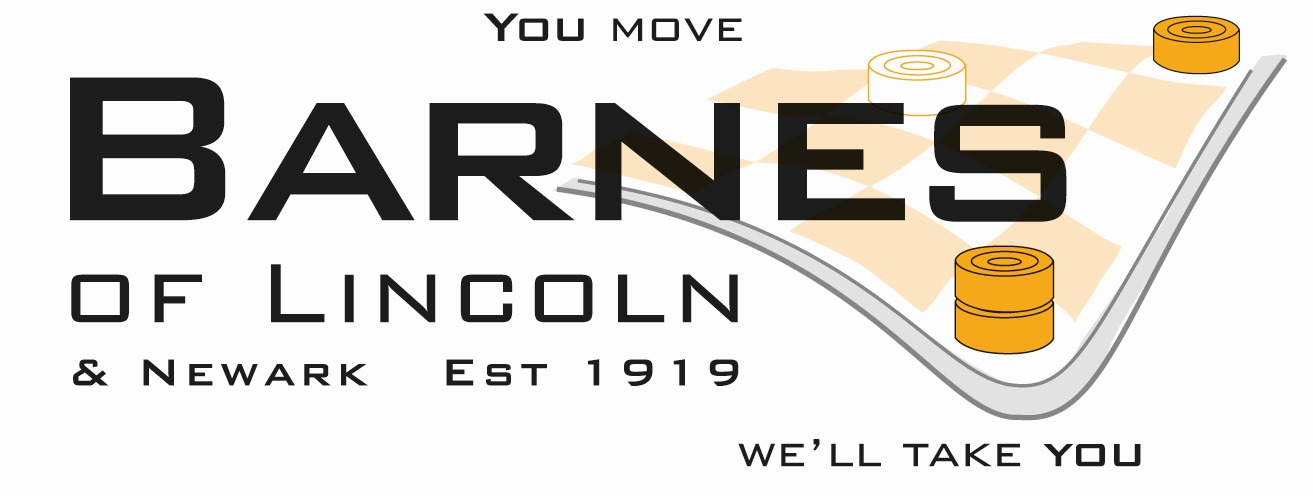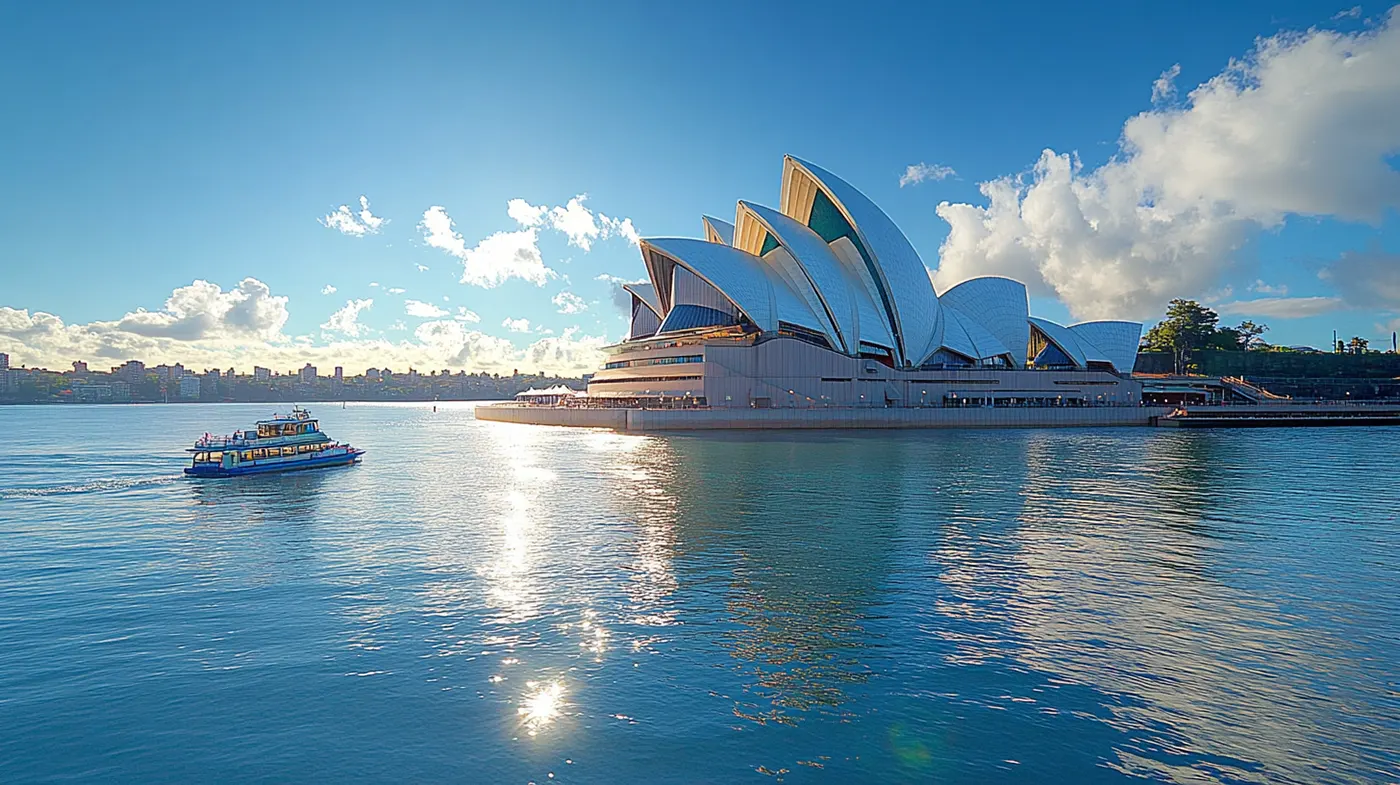Moving to Australia from the UK is an incredible but complex experience that can sometimes test your stress levels to the limit.
However, leaving the familiar shores of Britain and settling in a new continent is not to be taken lightly.
As long as you start this sometimes-arduous journey with your eyes open and know from the outset that it will take time, significant effort and a lot of patience and planning, you will get there in the end.
And when you do, what a fantastic lifestyle awaits you.
The country regularly tops the list of global relocation destinations with its sunny climate, diverse job market, and world-class amenities.
Whether you’re heading Down Under for career growth, a family adventure, or simply the allure of its beautiful landscapes, this guide will walk you through everything you need about migrating to Australia from the UK.
From visa requirements and housing options to healthcare and cultural differences, each section offers detailed insights to help you transition smoothly.
By the end, you’ll feel better prepared to take on the challenges and seize the opportunities and rewards that await you in Australia!
Why Choose Australia?
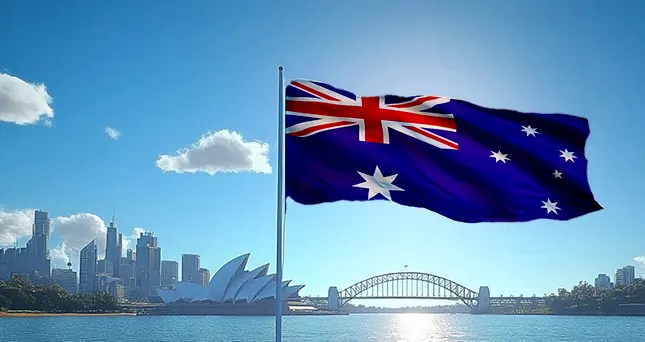
One of the main draws of Australia is its relaxed atmosphere and strong focus on a healthy work-life balance.
While the country’s urban centres such as Sydney, Melbourne, and Brisbane, are thriving business hubs, Australians also value their downtime, whether that involves trips to the beach, bushwalks in national parks, or enjoying weekend barbecues.
If you’re used to the fast-paced rhythm of cities like London, you might find Australia’s blend of cosmopolitan energy and laid-back coastal living refreshing.
It’s a country where people take time to get to know you, even in its busy cities.
Neighbours will make the effort to welcome you and involve you in social activities.
In time, other UK expats already enjoying the Australian Dream, will become more like family than friends.
But it does mean that you, too, need to be brave and stretch yourself beyond your usual boundaries. You will reap huge rewards if you do!
The Australian Climate
While the weather down under is another huge draw for us Brits, it is important to state that temperatures in some parts of the country are off the scale in the summer months.
As an example, these locations provide more temperate conditions:
- Southwest Coast of Victoria – Close to the Great Ocean Road, temperatures are more moderate due to coastal breezes. Summers can still be warm, but generally less intense than in inland areas.
- South Australia’s Coastal areas – Locations like Victor Harbor also tend to have relatively mild summers compared to inland regions of the state.
- Southwest Western Australia – Margaret River Region: This coastal area south of Perth benefits from ocean breezes, moderating summer temperatures and creating a more comfortable climate than inland WA.
- Blue Mountains, New South Wales – Higher elevations typically have cooler temperatures. The Blue Mountains, just outside of Sydney, can be significantly milder, especially during evening hours.
- Southeastern Coastlines – Coastal cities like Melbourne (though it can have hot spells) are known for rapidly changing weather, often accompanied by cool southerly winds that provide relief from the heat.
Sensible preparation and strategic location choices can help UK arrivals adjust more comfortably.
Living in Australia’s cooler regions means you can enjoy all the outdoor activities and cultural experiences on offer without overheating!
High Quality of Life

Australia consistently ranks high on global quality-of-life indexes.
The OECD Better Life Index and the UNDP Human Development Reports both agree that Australians enjoy one of the highest quality of life in the world.
According to recent surveys and government reports many of the country’s cities stand out for their robust infrastructure, comprehensive healthcare, and effective education system.
For families, this means access to modern facilities, safe neighbourhoods, and a strong emphasis on community well-being.
The cost of living may often be higher (which we will explore in more depth later) than in the UK; however, it is well worth the sacrifice to enjoy such a great standard of living.
Natural Beauty and Outdoor Adventures

Australia’s natural landscape is incredibly diverse, from the red sands of the Outback to the lush rainforests of Queensland.
People who love the outdoors can explore the Great Barrier Reef hike in the Blue Mountains, or drive along the stunning Great Ocean Road.
Whether you’re passionate about water sports, trekking, or simply absorbing breathtaking scenery, you’ll find an abundance of destinations to enjoy year-round.
No matter where you choose to settle, Australia offers a plethora of things to do, see, and be inspired by.
Here is a list of 25 amazing things to do in Australia in 2025.
Opportunities for Career Growth

Many UK expats will have already secured employment before arrival in Australia.
Despite the lack of manpower across numerous sectors, there is a good chance that those with in-demand skills can find their dream jobs somewhere in the country.
Australia’s economy has remained resilient over the past decade, driven by sectors such as mining, technology, healthcare, education, and tourism.
Major cities like Sydney, Melbourne, and Perth offer a wealth of professional opportunities for skilled workers.
Many UK professionals discover that their skills transfer smoothly into the Australian market, thanks to comparable standards in education and training.
This synergy often creates ample prospects for career development and entrepreneurial ventures.
Check out this helpful link to finding a job in Australia.
Understanding the Visa Process
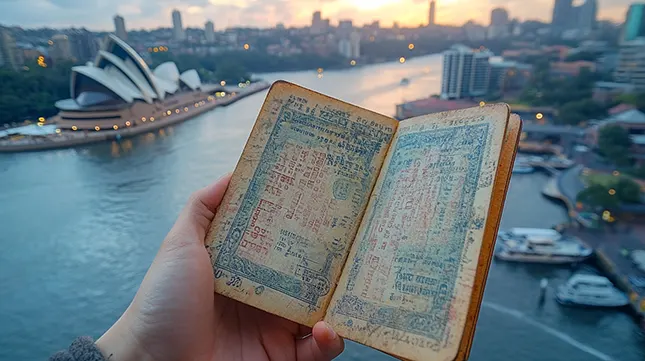
Of course, committing to a move Down Under isn’t as simple as hopping on a plane: your Australian adventure starts with the right visa.
Think of your visa as your entry pass to the Aussie dream. So, do your research, consult the pros, and ensure that your official stamp is spot-on before you get there.
Because navigating Australian immigration can be one of the most challenging parts of your move, it is also one of the most vital. Take time to visit the Department of Home Affairs website.
The site provides multiple visa categories tailored to different needs.
It’s crucial to research each option thoroughly and consult with a qualified migration agent if necessary.
Here are four of the most common visas and a little background information about each:
- Skilled Migration Visas
If you have professional qualifications or skill sets in demand, you may qualify for a Skilled Independent Visa (Subclass 189), Skilled Nominated Visa (Subclass 190), or a Skilled Work Regional (Provisional) Visa (Subclass 491).
The Australian government uses a points-based system that assesses age, English proficiency, work experience, and educational background.
Remember that these requirements can change annually based on Australia’s labour market demands.
The Home Affairs website has a list of the most “in-demand jobs” in Australia.
Check it out and see if your skills match any of them.
- Employer-Sponsored Visas
UK professionals who have a job offer from an Australian employer may be eligible for Temporary Skill Shortage (TSS) Visa (Subclass 482) or the Employer Nomination Scheme (Subclass 186).
These visas generally require a sponsorship from a recognised Australian business and can lead to permanent residency if certain conditions are met over time.
- Family and Partner Visas
For those moving to join family members already residing in Australia, partner visas or family reunion visas may be applicable.
This route usually involves sponsorship from an Australian citizen or permanent resident who can vouch for your financial and personal support.
- Working Holiday Visas
The Working Holiday Visa (Subclass 417) is popular among younger UK nationals, typically aged 18–30 (though age limits can vary).
It allows you to travel and work in Australia for up to 12 months.
Like all countries, the eligibility criteria can be changed at a moment’s notice, so make sure to check the official Home Affairs website for the latest details.
This site also provides information about processing times, which differ depending on the visa you are applying for.
- Permanent Residency and Citizenship
Most Brits quickly settle into the Aussie way of life and never look back. For them, the next stage of the journey is to make it officially permanent.
After living and working in Australia for a certain period (usually four years of legal residence for citizenship eligibility), you can apply for permanent residency and citizenship.
This grants you the right to live, work, and access social benefits without the need for continuous visa renewals.
A final Word About Visas
Applying for an Australian visa can be a complicated and confusing process, so it is highly advisable to consider immigration assistance.
They will provide help specific to your circumstances and visa. They can interpret the sometimes difficult legal jargon, assist you with any problems you may encounter, and ultimately help you lodge your documentation correctly.
However, only certain people can help you with your visa application.
The first is a migration agent. You must use a registered agent who is a member of OMARA, the Office of the Migration Agents Registration Authority.
You can download a guide about finding a registered agent here.
The second is a legal practitioner, a lawyer who holds an Australian legal practising certificate (whether restricted or unrestricted).
You can find a list of reputable lawyers on the Law Council of Australia’s website.
Whatever you choose is a personal choice, but hiring the services of registered bodies is an absolute must.
More about Life in Australia
Once you have submitted your visa application and are awaiting approval, your focus will turn to other factors that will influence your Australian relocation.
Here is some practical information you may want to consider and prepare for upon your arrival.
While Australia’s wages are generally higher than those in the UK, the cost of living can also be substantial, particularly in major cities.
Groceries, utilities, and rent can be more expensive than in some parts of the UK, but your salary may compensate for these costs if you’re employed in a high-demand profession.
Cost of Living in Australia

Housing and Rent
Property prices and rental costs will vary significantly based on location.
Cities like Sydney and Melbourne often have the highest housing expenses, while regional areas and smaller cities like Adelaide or Hobart tend to be more affordable.
If you are unsure about what you can afford, whether you are buying or renting, Australia has some very reputable real estate agent websites that are useful for comparing current prices, viewing available properties, and getting a feel for different locations:
Take a look at: Domain, realestate.com and Harcourts.
Groceries and Everyday Purchases
Just like the UK, Australia has numerous large supermarket chains.
By visiting their websites, you can get a really good overview of how much you are likely to spend on your weekly shop.
Supermarkets like Woolworths and Coles are popular brands in Australia and dominate the retail sector. They offer a wide range of local and imported products.
Independent grocers, farmers’ markets, and speciality shops can also be found in most urban centres.
Essential grocery items such as milk, bread, and produce remain competitively priced, but imported goods can be costly due to higher transportation and import fees.
Numbeo, the cost-of-living website, is another excellent tool.
You can even compare prices between the UK and Australia, so you can really get a great insight into costs item by item.
Utilities and Transportation
According to Numbeo, electricity, water, and internet costs are cheaper than in the UK, though switching providers and choosing energy-efficient homes can help you save even more money.
While public transport systems in major cities offer weekly, monthly, or yearly passes, which can be more economical than daily tickets, what you pay is generally more expensive than at home.
However, if you plan to live in the outer suburbs, a car might be indispensable, especially for families juggling various commitments. In this instance, Australia wins, with fuel costs around 37% cheaper.
The same applies to buying a new car. In comparison to England, you could potentially save up to 40%.
It is a bit of a mixed bag overall, where you will win in some cases and lose in others.
Healthcare Costs
A major difference in the Australian way of life is healthcare. Unlike in the UK, there is no NHS equivalent.
You will soon become familiar with Medicare, Australia’s publicly funded healthcare system. It ensures universal access to various health services and is primarily funded by taxes.
Coverage includes consultations, tests, treatments in public hospitals, and some private treatments. Australians often use a Medicare card to manage costs and alongside this opt for private insurance to reduce waiting times and extra expenses.
However, Medicare only covers citizens and permanent residents.
In certain circumstances, some temporary residents or expats may be eligible under Reciprocal Health Care Agreements (RHCAs) if they’re from specific partner countries (e.g., the UK, New Zealand, Sweden).
These agreements usually grant access to Medicare for medically necessary treatment.
Expats not covered by RHCAs or without permanent residency must typically have private health insurance. Requirements vary by visa, so it’s crucial to check eligibility and coverage details.
You may want to explore the services Medicare offers, how to enrol, and how to claim should you need to. They have a very user-friendly website for more in-depth information.
To make a real success of your Australian relocation, understanding the cost of living in Australia before relocating empowers you to budget effectively and avoid financial surprises.
Consequently, you’ll experience a smoother transition, reduce financial stress, and feel more confident about settling into your new environment.
Finding the Right Home Down Under

Renting a Home
Your choice between renting and buying often depends on how long you intend to stay and your financial circumstances.
Many newcomers prefer to rent initially, which is a very sensible choice.
Renting means you can take time to explore different neighbourhoods before committing to a purchase.
Plus, it will also give you time to ensure that you really do want to make Australia your permanent home ahead of an expensive house purchase.
Keep in mind that some rentals require references from previous landlords or employers, so gather the necessary documents early.
Renting Inspections and Application Tips
When attending viewings, arrive with a list of questions about rental terms, noise levels, and local amenities.
Australia’s tenancy laws vary by state, so visit official state government websites for detailed legal guidelines once you have decided where exactly you are choosing to stay.
Thorough research and preparation will streamline the application process, especially in competitive markets like Sydney and Melbourne.
As a rough guide, you can spend some time researching the rental system and how it works online, which is produced by the NSW Government.
As far as cost goes, you can expect to pay rent of between $1682-$2131 (£845-£1070) for a one-bedroom apartment per month.
For a larger property with three bedrooms, the prices increase to around $2606-3525 (£1309-£1772) per month.
Expat websites are a great source of help when the time comes for you to rent a property.
ExpatExhange has produced an insightful step-by-step guide to renting a home in Australia.
Buying a Home in Australia
Buying a home in Australia as a UK expat can be a smooth process if you understand the requirements and plan carefully.
First, check that you qualify under your visa conditions to buy a home in Australia.
if you hold permanent residency or certain special visas, you may have fewer restrictions.
Otherwise, you might need approval from the Foreign Investment Review Board (FIRB). The FIRB typically requires non-residents to purchase new rather than existing homes.
Next, set a realistic budget and seek pre-approval for a mortgage.
Many Australian lenders will consider overseas income, but ensure you compare interest rates and fees.
Once you find a suitable property, engage a licensed conveyancer or solicitor to manage contracts and protect your interests.
Factor in additional expenses, such as stamp duty, potential FIRB fees, and ongoing costs, such as council rates and utilities.
Having a deposit of at least 20% can help secure better loan terms.
Finally, arrange for building inspections, finalise your mortgage, and prepare for settlement.
Although this is a simplified explanation of how to purchase a home in Australia, it will give you a basic understanding of the requirements.
Real estate websites are a much more accurate source of up-to-date data when it comes to house prices.
With diligent research and professional support, you’ll be well on your way to owning a home in Australia.
As nationwide house price data is not yet available for 2025, based on recent trends and projections from late 2024, the national median house price in Australia hovers around AUD 700,000–800,000 (£351,750 – £402,000).
Unless you are bound to a particular location for reasons such as work or family, you have a myriad of wonderful places to call home!
Popular Areas for Expats
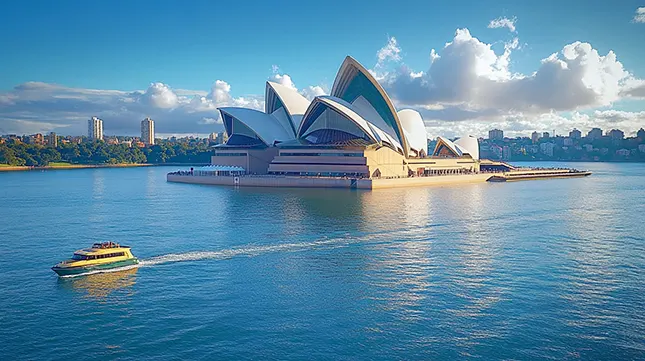
- Sydney: Coastal areas like Manly or Bondi are renowned for their beaches, while North Shore suburbs such as Mosman or Neutral Bay offer family-friendly communities and easy city access.
- Melbourne: Inner suburbs like Fitzroy, Carlton, and St Kilda are popular for their café culture and nightlife, while outer areas like Box Hill and Glen Waverley attract families seeking good schools and more space.
- Brisbane: Riverside suburbs like New Farm and Kangaroo Point are desirable for young professionals, while Fig Tree Pocket or Kenmore suit families thanks to larger properties and reputable schools.
- Perth: Coastal locales such as Cottesloe, Scarborough, and Fremantle offer a vibrant, laid-back lifestyle, whereas Joondalup and Subiaco cater to diverse needs with proximity to universities and shopping centres.
- Adelaide: Beachside Glenelg and Brighton provide a relaxed coastal lifestyle, while Norwood and Burnside boast leafy streets, heritage homes, and family-friendly communities.
- Canberra: Kingston and Manuka offer cosmopolitan cafés and restaurants, whereas Belconnen and Gungahlin are popular with families for their suburban amenities and proximity to schools.
- Gold Coast: Surfers Paradise and Broadbeach combine iconic beaches with an energetic nightlife, while Robina and Varsity Lakes feature schools, shopping precincts, and family-oriented neighbourhoods.
- Hobart: Sandy Bay and Battery Point are known for waterfront views and charming heritage buildings, while North Hobart is celebrated for its lively dining scene and arts culture.
From Sydney’s stunning beaches to Hobart’s historic charm, Australia boasts a diverse range of suburbs tailored to every expat’s lifestyle.
Whether you crave bustling cafés, top-notch schools, or a relaxed coastal vibe, these cities and surrounding areas can accommodate you.
A well-chosen suburb sets the tone for an enjoyable, rewarding life in the Land Down Under.
Education and Schooling

Attempting a long-distance relocation with children definitely adds another layer of worry; however, you don’t have to worry about this if you’re heading to Australia.
The country takes education very seriously, and there are some fantastic options for all ages.
You can find plenty of insightful information from several sources:
The Australian Government Department of Education offers a broad overview of policies, funding, and regulatory guidelines for schools and tertiary institutions.
While the Australian Curriculum Website provides in-depth details on subject requirements, learning milestones, and national standards for each year level.
Children between the ages of six and sixteen are legally required to attend school in Australia.
Public schools are usually free for citizens and permanent residents, though certain small fees for uniforms, stationery, or extra-curricular activities may apply.
Most states have catchment areas, so where you live determines the public school your child can attend.
Early Childhood Education
Typically includes preschool or kindergarten for children aged 3–5. Schools for children at this age focus on basic social, emotional, and cognitive skills, preparing children for primary school.
Primary School
Usually starts at around age 5 or 6 and runs from kindergarten (or Prep) to Year 6 (though this varies slightly by state). The emphasis is based on foundational literacy, numeracy, and general learning.
Secondary School
Comprises Years 7–12, with compulsory attendance generally until the age of 16 or 17. Senior Secondary (Years 11–12) typically leads to a state-specific certificate (e.g., HSC in New South Wales or VCE in Victoria) required for university entrance.
Tertiary Education
Includes vocational training (e.g., TAFE courses) and universities offering undergraduate and postgraduate degrees. Entry into universities is often based on final-year secondary results or equivalent qualifications.
Because the country is so large, different territories may operate in slightly different ways, so it pays to research schools in your chosen location well before you arrive.
International and Private Schools
These are available, though they are generally situated in larger locations, and it is worth bearing in mind the costs associated with this type of education are often significant.
Tuition fees can vary significantly, from relatively affordable to extremely costly. Before enrolling, ask about the school’s academic reputation, class sizes, and extra-curricular opportunities.
Overall, education standards are extremely high across Australia, a fact that British expats who plan to move abroad with children will welcome.
Employment and Work Culture

Job Market Overview
Australia’s economy relies on diverse sectors, from natural resources to tech startups.
As of 2025, technology, healthcare, education, and construction are experiencing notable growth.
Mining remains a major driver in Western Australia, while service industries thrive in metropolitan areas.
Before relocating, it’s wise to apply for jobs or network via platforms like LinkedIn or Seek.
Platforms like these afford you the opportunity to see what is available and determine whether your particular skills and experience match what employers are looking for.
Work Environment
Australian workplaces often promote a cooperative culture with relatively flat hierarchies compared to the UK.
Colleagues and managers typically engage in open, direct communication.
While punctuality and professionalism are highly valued, Australians also appreciate a good sense of humour and a balanced lifestyle.
Don’t be fooled. Australians work extremely hard, though they love to play harder. It’s a great ethos!
Salary Expectations in Australia
Salaries in many industries are higher on average than in the UK, but so is the cost of living.
Negotiating a salary package that includes benefits, such as superannuation (Australia’s pension system), health insurance, or bonuses can significantly improve your overall remuneration.
Here is a snapshot of six commonly used roles in Australia, along with indicative average salary ranges for 2025.
Actual figures can vary based on location, experience, and employer. For the latest and most detailed data, readers can refer to the Australian Government’s JobOutlook website:
Registered Nurse. Average Salary Range: $80,000 – $95,000 (£40,320 – £48,380). Demand remains strong due to Australia’s growing healthcare needs.
Primary/Secondary School Teacher. Average Salary Range: $70,000 – $90,000 (£35,280 – £45,360). Salaries can increase with years of service, higher qualifications, or leadership roles.
Accountant. Average Salary Range: $70,000 – $100,000 (£35,280 – £50,400). Higher earning potential often aligns with CPA/CA accreditation and seniority.
Software Engineer/Developer. Average Salary Range: $90,000 – $120,000 (£45,360 – £60,480). Rapid tech growth fuels strong demand, with specialised skills often commanding higher wages.
Construction Manager. Average Salary Range: $100,000 – $150,000 (£50,400 – £75,600). Significant infrastructure and property development projects keep demand stable.
Retail Manager. Average Salary Range: $55,000 – $70,000 (£27,720 – £35,280). Income can vary widely depending on store size, location, and company profit-sharing structures.
Employment Rights and Regulations
Each state has its own labour laws, although the Fair Work Ombudsman provides nationwide guidelines, including minimum wage rates, leave entitlements, and working hours.
Familiarising yourself with these regulations ensures you’re treated fairly in your new workplace.
Embracing the Australian Lifestyle and Culture
Outdoor Pursuits
With abundant sunshine and a mild climate, Australians are incredibly active and love spending time outside.
Beaches, bushwalks, and sports like cricket, rugby, and Australian Rules Football are integral parts of local life.
Joining sports clubs or community activities is a great way to socialise and experience the Australian way of life.
Social Norms and Etiquette
Australians are generally friendly and informal. After initial introductions, first names are often used, even in business settings.
While English is the national language, brace yourself for unique Aussie slang. Common phrases like “G’day” (hello) and “No worries” (it’s okay) might quickly slip into your vocabulary.
Unlike in the US, tipping is not mandatory. However, rounding up the bill or leaving a small tip for good service is appreciated.
There is a huge “coffee culture” down under, and many Aussies go out for breakfast and coffee daily. Influenced by European migrants, local roasters, and a widespread passion for quality brews, Australians often favour independent cafés over larger chains.
Food and Dining Out
Australia’s cuisine is a vibrant mix of multicultural influences.
You’ll find British-style pubs, authentic Asian eateries, Middle Eastern restaurants, and everything in between.
Unsurprisingly, seafood remains a firm favourite.
Barramundi is often regarded as the nation’s most iconic fish.
Known for its mild flavour and flaky texture, it is commonly served grilled, pan-fried, or battered.
Other notable contenders include Sydney rock oysters, Moreton Bay bugs, and, of course, the ever-popular prawns on the barbecue. These dishes reflect Australia’s abundant coastal waters and love of fresh, high-quality seafood.
Public Holidays and Festivals
Australia Day (January 26), Anzac Day (April 25), and Queen’s Birthday (dates vary by state) are widely recognised public holidays.
Major cities host food and arts festivals throughout the year.
For example, the Melbourne Food and Wine Festival attract both locals and tourists, offering a chance to experience Australia’s creative side.
Sydney hosts several major events annually, such as the Italian Wine & Food Festival, the Wahroonga Food & Wine Festival, and the St Ives Food & Wine Festival.
Perth also has its favourite festival. The Good Food & Wine Show is an annual trade fair held at the renowned Perth Convention & Exhibition Centre (PCEC) in Perth.
Each state and city will have slightly differing public holidays, but all will hold numerous festivals throughout the year.
Pet Relocation
Many expats take their beloved pets along with them.
It is important to note that ensuring that you provide your animal with the least amount of stress possible requires a great deal of planning.
Australia has extremely strict quarantine regulations to protect its unique ecosystems.
Check the Department of Agriculture, Fisheries and Forestry website for the latest and most up to date information about import conditions and regulations, as your pet may need vaccinations or time in quarantine before joining you.
If you plan to arrange the shipment of your pet yourself, the DAFF have produced a practical step by step guide to help you though the process.
Hiring a pet travel expert pays dividends here. They arrange everything for you and help you navigate the paperwork and sometimes complicated animal import system.
It may not be the cheapest way to bring your pet over to join you, but it will be the least stressful. You can investigate costs here.
Pet travel companies successfully transport thousands of domestic pets into Australia each year. For more information, contact well-known agents such as Petair and Jetpets.
Driver’s Licenses and Vehicles

Australia, like the UK, drives on the left, which can ease the initial transition for British expats.
UK license holders can often drive in Australia on a temporary basis.
If you become a permanent resident, you usually need to transfer your license within a set time limit (often three months, but rules vary by state).
Visit your state’s transport authority for specific instructions. For example:
Local highways are well maintained, and driving can be very busy. As in cities such as Sydney, it requires patience and skill to navigate the road system until one becomes familiar with it.
Rural driving presents its own challenges: longer distances between towns, fewer fuel stops, and potential wildlife on the roads. Always plan ahead, keep your car well-maintained, and carry plenty of water if you travel cross-country.
Road tolls apply on certain bridges, tunnels, and highways; electronic tags and passes are commonly used for payment.
By staying mindful of these differences, new British expats can safely and confidently enjoy Australia’s open roads
Meeting New People and Settling In
It’s often said that one of the best ways to feel at home in a new country is to immerse yourself in the local culture. Australia’s famously warm, laid-back vibe makes it an inviting place to do just that.
Joining local clubs, sports teams, or social groups helps you find friends and gives you immediate insight into the Aussie sense of community, one that values camaraderie, outdoor activities, and a spirited, “have-a-go” attitude.
By participating in events advertised on platforms like Meetup, you’ll quickly discover how much Australians appreciate genuine interaction, whether it’s a casual beach barbecue, a neighbourhood soccer match, or a coffee catch-up with fellow hobbyists.
Moreover, volunteering at community events or charities provides a rewarding opportunity to give back while you settle in.
Such involvement fast-tracks your integration, helping you learn the local way of doing things, understand workplace and social norms, and pick up iconic Australian slang.
Embracing these new experiences fosters a sense of belonging, making it easier to establish friendships, navigate daily life, and truly appreciate what your new Australian home has to offer.
Final Thoughts and Next Steps

Moving to Australia from the UK is most definitely a life-changing adventure. It offers opportunities for personal growth, career development, and embracing a unique lifestyle.
While the visa application and logistical preparations can seem overwhelming at first, methodical planning will help you stay on track.
Australia’s combination of beautiful landscapes, robust job markets, and world-class healthcare and education systems makes it an enticing choice for many Britons.
By being proactive, contacting potential employers, organising finances, understanding local customs, and consulting official resources, you will quickly position yourself for a rewarding new chapter in life Down Under.
Whether you’re envisioning morning surf sessions before work or weekend family trips to lush vineyards, Australia’s diverse regions cater to a wide range of lifestyles and aspirations. Good luck!
Shipping Your Belongings with Barnes of Lincoln
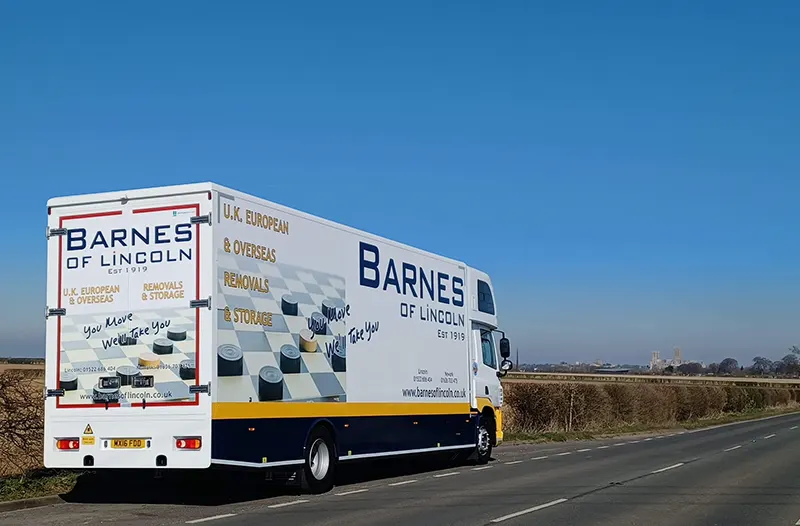
Ensuring your treasured possessions travel safely across continents is often at the top of the “to do” list when starting your Aussie journey.
That’s where Barnes of Lincoln truly shines. Drawing on over a century of heritage, it delivers a moving experience grounded in reliability and genuine care.
Having evolved from the humble beginnings of a grocer’s occasional removals service, we at Barnes of Lincoln have spent five generations refining the art of helping people start fresh in a new location.
This means you’ll benefit from a wealth of knowledge about managing the complexities of an international move.
Our devoted team understands that every household is unique. We offer flexible solutions and clear communication to keep you informed throughout the process.
One major concern for British expats making the leap to Australia is protecting their belongings during the lengthy journey. Barnes of Lincoln alleviates this worry by providing a comprehensive suite of robust packing materials.
Whether you’re shipping delicate glassware or a priceless family heirloom, the company’s seasoned professionals know precisely how to cushion and secure each item for maximum safety.
Alongside meticulous attention to detail, Barnes of Lincoln also emphasises personal support. Relocating overseas can be an emotional process, but with regular updates and a friendly, knowledgeable point of contact, you’ll feel confident and supported every step of the way.
Our competitive pricing and dedication to quality mean you receive exceptional value without compromising on service.
With deep family roots and a longstanding commitment to customer satisfaction, we ensure that your transition to Australian life is as stress-free and seamless as possible, allowing you to focus on the exciting journey ahead.
Give us a call or fill out our quick and easy contact form.
Our friendly team is ready to answer any questions and make your move as straightforward as possible.
